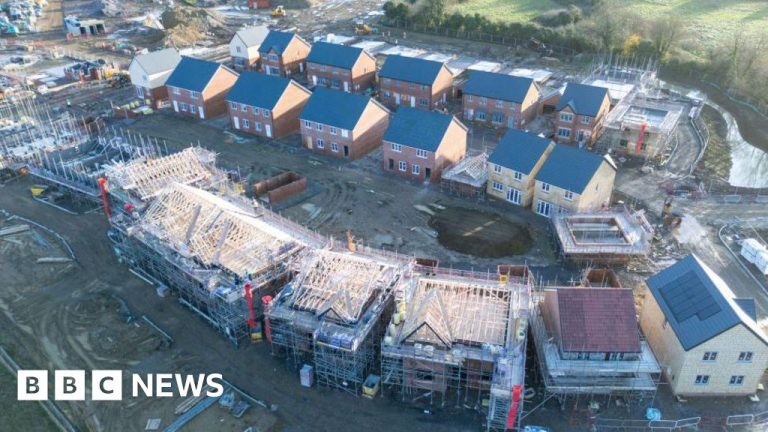Getty Images
The government will have the power to bypass council planning committees in England on projects to make it easier to build new homes.
Officials will be allowed to expedite the process by rubber-stamping proposals consistent with existing council strategies without obtaining approval from a committee.
Deputy Prime Minister Angela Rayner said the planning process acted as an “anchor” on targets to deliver more housing and pledged to deliver a “radical overhaul” of the local committee system.
Housebuilders have generally welcomed the streamlining, but councils have said a better solution would be to give them more resources.
A Conservative spokesperson said the government's plans are “nothing more than a list of empty promises that will do nothing to ensure Britain has the homes it needs where it needs them “.
Earlier this week, Prime Minister Sir Keir Starmer reiterated his commitment to build 1.5 million new homes by 2029, while acknowledging this could be “a little too ambitious”.
The fast-track planning process would apply to housing proposals and associated infrastructure such as schools, if they had already been widely approved as part of local development plans in which councils set out a land use strategy within their areas.
If the proposals “conform” to these plans, the government said, they could “bypass planning committees entirely to tackle chronic uncertainty, unacceptable delays and unnecessary waste of time and resources”.
Rayner said building more housing and infrastructure meant “unblocking the congested planning system that holds back growth”.
“Building 1.5 million homes over five years means tackling the housing crisis we have inherited head on, with bold action,” she added.
According to government planning statistics, between January and March 2024, only 19% of major applications were processed within the statutory 13-week time limit and only 38% of minor applications were processed within the statutory eight-week time frame.
The push for more housing could be popular among voters who are struggling to access the housing market.
But even small housing projects often face opposition from nearby residents for a variety of reasons, including concerns about the impact on local schools, doctors, roads and parking.
Removing the ability of local people to prevent development by making their case to a planning committee may result in a political backlash, particularly in rural areas.
Labor has already angered farmers by subjecting agricultural land to inheritance tax, and must cultivate support outside the cities if it is to maintain its political strength.
The Local Government Association (LGA) said that far from planning delays being the cause of the delay in house building, a million proposed homes had in fact been approved in principle by councils in their strategies local, but the developers had not presented plans.
Councilor Adam Hug, the council's housing spokesperson, said local authorities and communities “must be equal partners in tackling the housing crisis together”.
He added that this could be achieved through “new developments supported by the infrastructure needed to make communities thrive and appropriate consultation and engagement which can help ensure local people can benefit”.
EPA
Angela Rayner says she wants to unblock 'clogged planning system'
The Home Builders' Federation (HBF) said that while “democratic involvement and planning control” was a “fundamental part of the process”, it could be “very frustrating for candidates to see the principle of development debated again and again.
The Ministry of Housing also hopes to streamline the strategic planning process and introduce a requirement for better training for members of planning committees. A planning and infrastructure bill will be introduced next month.
Many leaders in local authorities and the property construction sector believe that the now mandatory target of 1.5 million new homes by 2029 will be impossible to achieve.
A Conservative spokesperson said the government had “set a housebuilding 'target' which the OBR has already said it cannot meet due to its own budget”.
The HBF agreed with the LGA that councils needed more planning resources and also called for more financial help for young home buyers.
Kate Henderson, chief executive of the National Housing Federation, told the BBC reforms were needed to meet the “huge challenge” of meeting the government's “really ambitious” housebuilding target.
She said local authorities must “plan for the current population and for the future population”, and called on the Government to facilitate coordination between councils to ensure social and affordable housing is provided as part of any increase of housing construction.
Next week the government will announce further reforms by updating England's planning rules, the National Planning Policy Framework.

